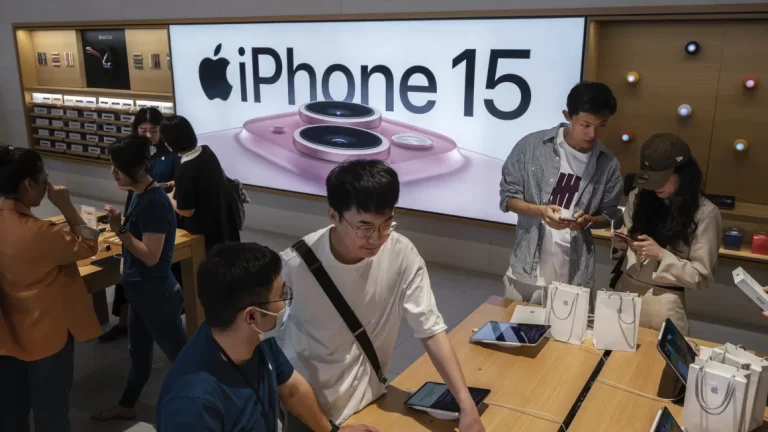Apple on Thursday posted first-quarter revenue of $90.8 billion, down 4% year over year, as the iPhone maker continues to struggle with growth challenges, particularly in China, amid an uncertain economic environment.
The company also announced a $110 billion share buyback – the largest in the company’s history – as iPhones sales declined 10%. The drop suggests weak demand for Apple’s iPhone 15 lineup, which came out in September.
The company reported $45.96 billion in iPhone sales for the three months ended March 31, slightly under projected estimates. Apple’s net income from the quarter slid to $23.6 billion, down slightly from the same quarter a year ago.
The company also announced Mac sales increased 4% to $7.5 billion and a services revenue of $23.9 billion, beating analyst estimates. During an earnings call, CEO Tim Cook largely focused on the bright spots from the latest period and teased the company will be sharing more about its vision for generative AI in the “weeks ahead.”
In addition, Apple reported iPad revenue of $5.6 billion, down 17% year over year. The news comes a few days before the company is set to host a press event where it’s largely expected to introduce updates to its iPad lineup and related accessories.
However, the company said it expects it iPad business and services to grow in double digits for the June quarter.
Apple’s wearables, home and accessories category, which includes AirPods, the Apple Watch and Vision Pro, saw revenue of $7.91 billion, compared to an estimate of $8.28 billion, despite the launch of the Vision Pro.
This marks the first earnings report since the launch of its biggest new product in years, its $3,499 mixed reality Vision Pro headset. Apple spent billions of dollars in research and development on the device, according to a recent analysis.
Most recently, Apple analyst Ming-Chi Kuo posted an updated forecast for the headset, stating production was being cut by several hundred thousand units. Cook said about 50% of Fortune 100 companies have purchased a Vision Pro headset “to explore things not possible yet.”
Apple shares rose past 7% in after-hours trading following the report.
Problems in China
In particular, the company has lost momentum in China as nationalism, a rough economy and increased competition have hurt Apple over the past several months. However, Cook said on the call iPhone sales are up in mainland China in the latest quarter.
But Chinese manufacturers, including Huawei and Xiaomi, have also made notable gains as consumers who once would have considered Apple are now turning to national brands in China. Market research firm IDC said Apple’s smartphone shipments tumbled a stunning 10% globally in the first quarter of this year.
“It’s a steep drop for Apple, but if you think of where we have been in the past four years, Apple has probably been the most resilient brand, overcoming supply chain issues and macro challenges, more than other brands,” said Nabila Popal, research director at IDC, told CNN at the time.
However, Cook said on Thursday the company set revenue records in more than a dozen regions, including the Middle East, Canada, Spain and Turkey.
The company’s stock price has slumped more than 8% in 2024 to less than $170 a share after reaching nearly $200 per share at different points in the past year. The company has overcome hurdles and threats many times before to reach a market capitalization of $2.6 trillion, making it one of the largest and most powerful companies in the world.
All eyes on AI
Cook also teased that generative-AI tools could be coming to Apple products in the near future, at a time when it’s currently behind competitors.
“We see generative AI as a key opportunity across our products and believe we have advantages that set us apart there,” he said. Apple is largely expected to introduce AI-powered tools at its annual Worldwide Developers Conference in June. It’s also reportedly in talks with ChatGPT-maker OpenAI to power an iPhone chatbot.
“We will be talking about it more as we go through the weeks ahead,” Cook added.


